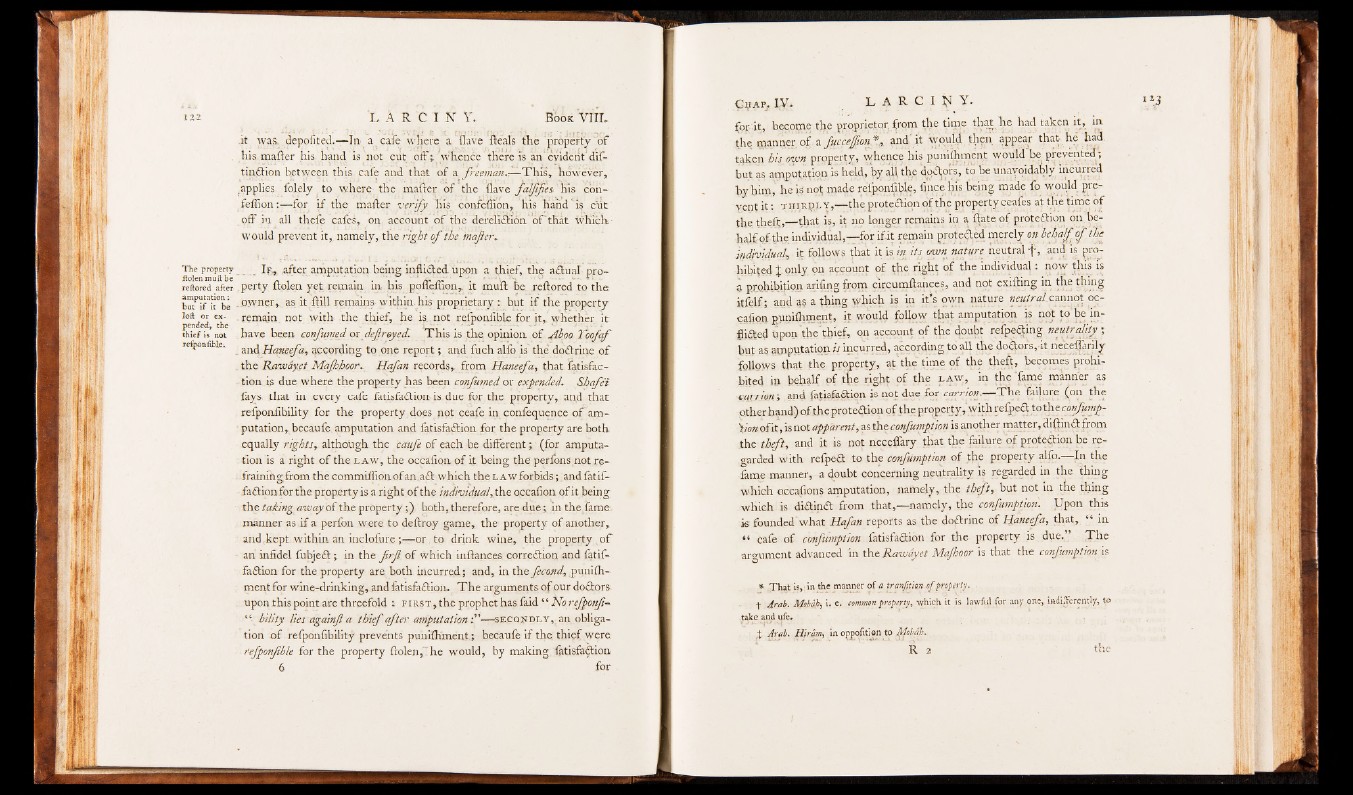
The property
ftolenmuftbe
reftored after
amputation:
but i f it be
loft or expended,
the
thief is not
refpoaliblev
i t was, depofited.— In a cafe where a Have fteals the property'of
his..matter his. hand is not cut .off;, whence there ls.an'eyident dif-
tinflion hetvyeen this, cafe and that of a freem.an.f-This, however,
applies., folely to where the mafter. of the )ftave fa lffe s Bis. cori-
feffion:^—fpr if the matter verify. his_ confemdn, his Kand'i? cut
off in all thefe cafes, on, account of the "derelidtion. of "that Which
would prevent it, namely, the right o f the ihajier-
__If,, after amputation being inflicted upon a t,hief, the a<ffuai property.
ftplen ye£ remain in- his pofleffion, it mull be .reftored to the
owner, as. it ftill remains within, his- proprietary ; but i f the property
remain not with -the jthief, he is^not refponfibie for it,, whether it
. have been confumed or defrayed. This is the opinion, of Ahoo Toofxf
. and Haneefa, Recording to nne report; and fuch alfo is" the dodtrine o f
. the Raway,et Mafhjooor, Hafan records, from Haneefa, that Satisfaction
is due where the property has been confumed or expended* Shafei
fays that in every cafe latisfadlion, is due for the property, and that
refponfthility for the property does not ceafe in confequence off amputation,
becaufe. amputation and fatisfadlion for the property are both
equalLy rights, although the cituft pf each be different;. (for amputation
is a right of the law, the occafion of it being the perfons not refraining,
from the cammiflionofan.adl which the law forbids; ;and fatif-
fadtion for the property is a right of the individual fa s, occafion pf it being
the taking awayof the property;) both,therefore, are duefn the.fame:.
manner as i f a perfon were to deflroy game, the property of another,
and,kept within an inclofure o r , to drink wine, the property .off
an infidel fubjedt; in the f i r f of which inftances. corredlion and fatif-
fadiion for the property are both incurred; and, in the fecond, punifhment
for wine-drinking, and fatisfadlion. T h e arguments of pur dodtors
upon this point are threefold : first, the prophet has faid “ No refponf-
“ bihty lies againf a thief cfter amputation— secondly, an. obligation
of refponfibility prevents punifhment; becaufe if the. thief .were
rfponfble for the property ftolen,'he would, by making fatisfadlion
6 for
c ^ap, ry* l a r c i iji y .
pQj- it, become tlie proprietor, from the time that he had. taken it, in
ftie manner of - a fuccefjonf,, and .it would. then appear that- he had
taken his own property, whence his punifhment would be prevented;
but 95
by him > he is? n 9 jw j e re£on$>Je, fince his. bem§ ip would, prevent
i t : --TfffiRRLY,— the protedlion opthe property ceafes aj the time of
the theft,— that is, it no longer remains in ^ ^ c o f proteftion on .’behalf
ofthe. individual,— for iff.it remain prote&ed merely on bfhatf o f the
individual, it follows .that itj^in i f own nature neutral f , land is prohibited
X only, on account of the right of the individual: now this is
4 prohibition arising from cdrcumftances, and not exifting in the thing
itfelf; and. as a thing which is in ids own nature occafion
punifhment, it would follow that amputation js not to‘be in-
ftidled Upon the thief, on account of tjje'4pubt' re(j>©§ing \
but as amputation is incurred, according to all the dolors,-it necefjariiy
follows that the property, at'the time of the tjie&, becomes prohibited
in behalf pf tjle right of the law, in the ‘fame manner as
cajrion-, and fetisfedbion is not due for carrion.— T h e failure (on the
other hand) ofthe protedfion of theprpperty,‘ withref£edt to the confiimp-
\ion ofit, is not apparent, as the confumption is another matter, dif|indt from
the theft, and it is not neceffary that the failure of projection be regarded
with refpedt to the confumption of tfie property alfo.— In the
fame manner, a doubt concerning neutrality is regarded in the thing
which occasions amputation, namely, the theft, but not in the thing
which is dictinrt from that,— namely, the confumption. fJpon this
is founded'what Hafan reports as the doctrine of Haneefa, that, “ in
“ cafe of confumption .fatisfadlion for the property is due,” The
argument advanced in theRawdyet Majhoor is that the confumption is
* ^That is,: in the manner of a tranfition of property. ■
+ Arab. Mob$b-> i. e. common property, which it is lawful for any one, indiJerently, to
tajke and ufer
t Arab. Hiram-, in oppofition to Mobah.
R 2 the